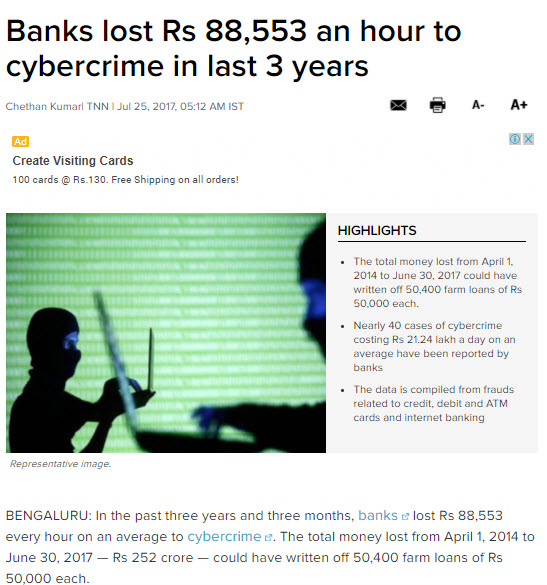Times of India carried a report today headlined ‘Banks lost Rs 88553 an hour to Cybercrime in last 3 years”. According to the report, the total money lost from April 1, 2014 to June 30, 2017 due to Cyber Crime was Rs 252 crores.

Data computed from the reports made to RBI has reportedly indicated that nearly 40 cases of cybercrime costing Rs 21.24 lakh a day on an average has occurred in India. This is the data of 102 banks of all categories obtained from the Reserve Bank of India. In all, 46,612 cases were reported in the said period.
We have always disbelieved the statistics reported by the Banks to the RBI since Banks for a large part have disowned frauds and always blamed the customers for parting with the credentials for a phishing attack and declined to register customer complaints as “Bank frauds” and report it to RBI.
Hence we consider that the above statistics only includes the losses that the Banks have not been able to push off to the shoulders of the customers since they were frauds involving ATM where no customer might have been targeted or where the frauds were due to reasons which directly indicted the fraud within the Banking system.
The actual frauds and the loss that the customers have suffered would be much more than the amount which the article mentions.
They need protection and it is heartening to take note that there is some thinking int he Government to consider mandatory Cyber Insurance at least to some categories of customers as Naavi has been suggesting for a long time provided the unwilling Bankers can be tamed.
What is surprising is that Banks continue to suffer because they have been grossly negligent on the security measures that have been mandated on them by RBI. Hence there is no need to be sympathetic to the losses suffered by the Banks. It is a their own creation.
Just to give an example, we can look at the cloned cards that have been used to withdraw money from the ATMs. What prevents the banks from having active CCTV cameras and using face recognition as additional authentication to allow a transaction and disable the transaction if CCTV and face recognition is not functioning?… Is it cost?…then let them spend Rs 88553 per hour in the future also… It is for the share holders of the Banks to question the Banks about the loss caused by the negligence of their CEO.
Most of the Banks are yet to implement the RBI instructions on the July 7 circular on “Limited Liability for Frauds”. ..Probably they are building a case for some kind of sympathy through articles such as these.
Customers have been fleeced by these Banks in the form of increased cost of E-Banking and Banks have collected enormous money directly in the form of service charges without being able to improve security.
In this respect Banks have become like politicians who keep on raising taxes and fill up the coffers of the Government only to increase the salaries of MPs, MLAs and Government employees while all the services are being implemented on “Toll charge basis”.
Why should there be a Government and Taxation system if the taxes are not being made available except to pay the Government employees and politicians? … is a question all honest citizens often ask. Now, a similar question can be asked for Banks. It is necessary for Banks to account for all the increase in service charges they have made since last one or two years and provide an account of how the increased revenue has been used.
I urge RBI to audit the increases in service charges made by Banks in the last three years and how the revenue has been deployed to improve security of transactions.
Naavi







